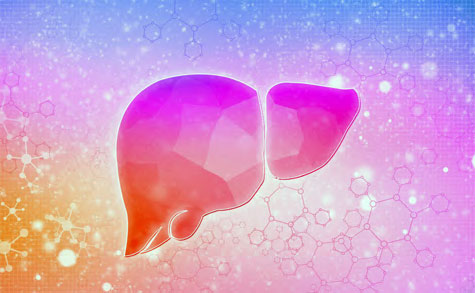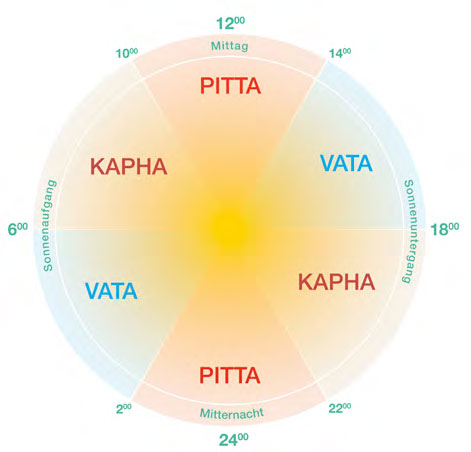The liver - often underestimated power organ
"I feel fatigued all the time," "I sleep well but am still tired," "I have a barely noticeable feeling of pressure in my right upper abdomen." Patients with a strained liver describe their rather unspecific symptoms in this way or in a similar way. However, these are often so atypical that they are usually only detected by the doctor at a very late stage during a blood or ultrasound examination. And it doesn't matter whether the liver disease is caused by alcohol consumption, harmful drugs, genetic factors or bacteria and viruses.
 The liver is our central metabolic and detoxification organ. Its tasks include the synthesis of proteins and the purification of blood. If it does not function properly, metabolic waste products and toxins accumulate in the body. In Ayurveda, these metabolic residues are called ama. An improper diet, excessive consumption of alcohol as well as the intake of certain medications but especially our environment puts an enormous strain on this organ. According to Maharishi Ayurveda, liver diseases begin with the loss of natural balance. Wenn wir Nahrung zu uns nehmen, ist die Leber maßgeblich daran beteiligt, diese zu verarbeiten. This is not done directly, but first through the intestines and then the portal circulation, which runs from the intestinal vessels like a highway toward the liver. This large highway then branches off into interstate highways and ever-smaller pathways that traverse the liver as a fine network, funneling all nutrients through the liver filter. Hardly anyone has any idea of the complexity of this system and of how many different ways the liver works - completely autonomously and without us noticing anything. The liver could also be called a life maker; if it functions well, we are fit and vital. If it is overloaded, we feel listless, tired and depressed.
The liver is our central metabolic and detoxification organ. Its tasks include the synthesis of proteins and the purification of blood. If it does not function properly, metabolic waste products and toxins accumulate in the body. In Ayurveda, these metabolic residues are called ama. An improper diet, excessive consumption of alcohol as well as the intake of certain medications but especially our environment puts an enormous strain on this organ. According to Maharishi Ayurveda, liver diseases begin with the loss of natural balance. Wenn wir Nahrung zu uns nehmen, ist die Leber maßgeblich daran beteiligt, diese zu verarbeiten. This is not done directly, but first through the intestines and then the portal circulation, which runs from the intestinal vessels like a highway toward the liver. This large highway then branches off into interstate highways and ever-smaller pathways that traverse the liver as a fine network, funneling all nutrients through the liver filter. Hardly anyone has any idea of the complexity of this system and of how many different ways the liver works - completely autonomously and without us noticing anything. The liver could also be called a life maker; if it functions well, we are fit and vital. If it is overloaded, we feel listless, tired and depressed.
The functions of the liver at a glance
 The liver's most important task is to examine everything we eat for possible toxic substances. If it finds one, it does everything it can to render the substance harmless and convert it into a form that the body can tolerate. If the liver reaches its load limit, our organism tries to store the toxins in fat cells. This is also often the reason why one can sometimes feel miserable during a (fasting) cure, because during this time many toxins are mobilized, which then enter our body cells via the bloodstream. So detoxification is the main task of the liver, but beyond that it has many other functions:
The liver's most important task is to examine everything we eat for possible toxic substances. If it finds one, it does everything it can to render the substance harmless and convert it into a form that the body can tolerate. If the liver reaches its load limit, our organism tries to store the toxins in fat cells. This is also often the reason why one can sometimes feel miserable during a (fasting) cure, because during this time many toxins are mobilized, which then enter our body cells via the bloodstream. So detoxification is the main task of the liver, but beyond that it has many other functions:
- Metabolizing cholesterol
- Energy storage and provision for stable blood glucose levels
- Infection control
- digestion of fats through the production of bile
- Storage of nutrients and vitamins, such as vitamin B12
- Protein metabolism
- Hormone metabolism
In Ayurveda and also in Traditional Chinese Medicine, the liver is associated with the emotions of anger and frustration. Accordingly, detoxification takes place not only on a physical but also on an emotional level. If liver function is impaired, this often leads to an imbalance on the emotional level as well. In the vernacular, this is known by proverbs such as "I'm overflowing with bile" or "A louse has run over my liver." Emotions that are not metabolized are directed inward and cause bitterness and resentment in the long run.
The liver from the Ayurvedic point of view
The liver and the digestive organs in the upper abdomen are particularly associated with Pitta dosha. This is where our digestive fire burns and ensures the transformation of the ingested food. People with a high Pitta content in particular have a sensitive liver metabolism and are more prone to increased acid formation, which can manifest itself as heartburn, for example. These people produce a comparatively large amount of digestive juices and are often hungry. People with a higher proportion of Kapha, on the other hand, are more prone to viscous bile and the formation of gallstones, so that an adapted diet is particularly important here. With predominant Vata, on the other hand, the digestive power is rather variable and these people can usually only digest small portions or very easily digestible food well. So it makes perfect sense to have the main meal at noon, when the digestive fire is burning the strongest, and to resort to warm and light foods in the evening, such as soups, stews or light curries. Animal products, such as eggs, sausage and cheese, as well as meals with a high fat content, are considered difficult to digest in the evening. These often remain in the stomach for so long that sleep quality can be impaired. In the circadian rhythm, the times from 10 am - 1 pm and from 10 pm - 2 pm are assigned to Pitta dosha. These are times of transformation and transmutation. In order to provide energy for these diverse building and regenerative processes, it is important to go to sleep at 10 pm. This is because only in a state of rest can the liver perform its many tasks without major distractions. 
Actively supporting the liver with the right diet
Our liver loves the color green. In Ayurveda, green is considered to balance Pitta, which is why heated minds can calm down so well in nature and especially in the forest. Similar to a walk in the woods, abundant green leafy vegetables and especially wild herbs calm excess pitta, which is now abundant in our environment. The green color is caused by the secondary plant substance chlorophyll, which has a strong blood purifying effect. At the same time, green plants also contain bitter substances that actively support liver metabolism and have an appetite-suppressing effect.
Suitable are, for example:
- Wild garlic
- spinach
- Arugula
- Dandelion
- goutweed
- Parsley
- Stinging Nettle
- celery
- Swiss chard and many more.

Leafy greens and green vegetables should be on the daily menu and can also be enjoyed in green juices in the highest concentration of nutrients. In the morning, the day could be started with a green juice or green smoothie, which puts little strain on the digestive power and at the same time floods the body with micronutrients. This gives long noticeable energy, quite different from a coffee drunk in a hurry. At noon, there is sufficient digestive power, so that the main meal can be taken here. Whereas in the evening, as already described, light and plant-based meals should be eaten. In addition, the metabolism can be supported by hot water, which is a blessing for the entire digestive tract through a decoction with a mixture of coriander, cumin and fennel seeds. For this you can simply boil 1 liter of water with a tablespoon of the seed mixture and gladly also a few ginger slices for 10-15 minutes bubbly and then drink sip by sip over the day.

Even a once-a-week liquid day of smoothies, green juices and soups can go a long way in relieving the digestive system and giving it a chance to regenerate.
Medicinal herbs for the liver
Amalaki, the Indian gooseberry, is a powerful antioxidant that helps the liver do its job and can balance acidic properties of foods. It has an alkalizing effect, i.e. deacidifying the tissues, and can thus alleviate inflammatory processes. You can take it as a single substance or by taking Triphala before going to bed. Triphala contains two other berries besides amalaki, which have a mild laxative effect and also regenerate the intestinal mucosa. Overall, plants that taste bitter are considered liver-supportive, as they improve fat digestion and increase the flow of bile juices. Here you can resort to native herbs such as wormwood, yarrow, dandelion or milk thistle, but also to Ayurvedic herbs such as neem or turmeric.
For more support
More and more patients are experiencing that conventional therapies alone are not enough. They recognize that the path to recovery must take place at all levels. In the case of liver disease, for example, the focus can be on the elimination of toxins or sparing through a balanced diet. It is important to bring the natural regulatory principles back into a necessary balance. Dietary recommendations, helpful exercises as well as special herbal mixtures - all put together especially for you - help you to lead a more conscious lifestyle. So that your natural self-healing powers can restore the healthy function of the liver.
Authors: Dr. Karin Pirc, Dr. Sarah Gabriel / © Maharishi Ayurveda Privatklinik Bad Ems


We look forward to your feedback!